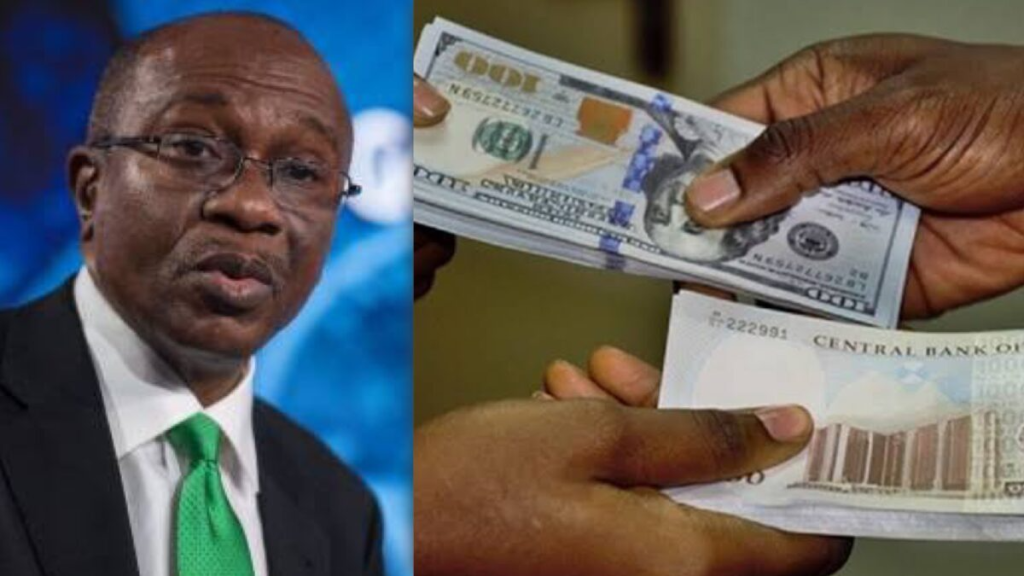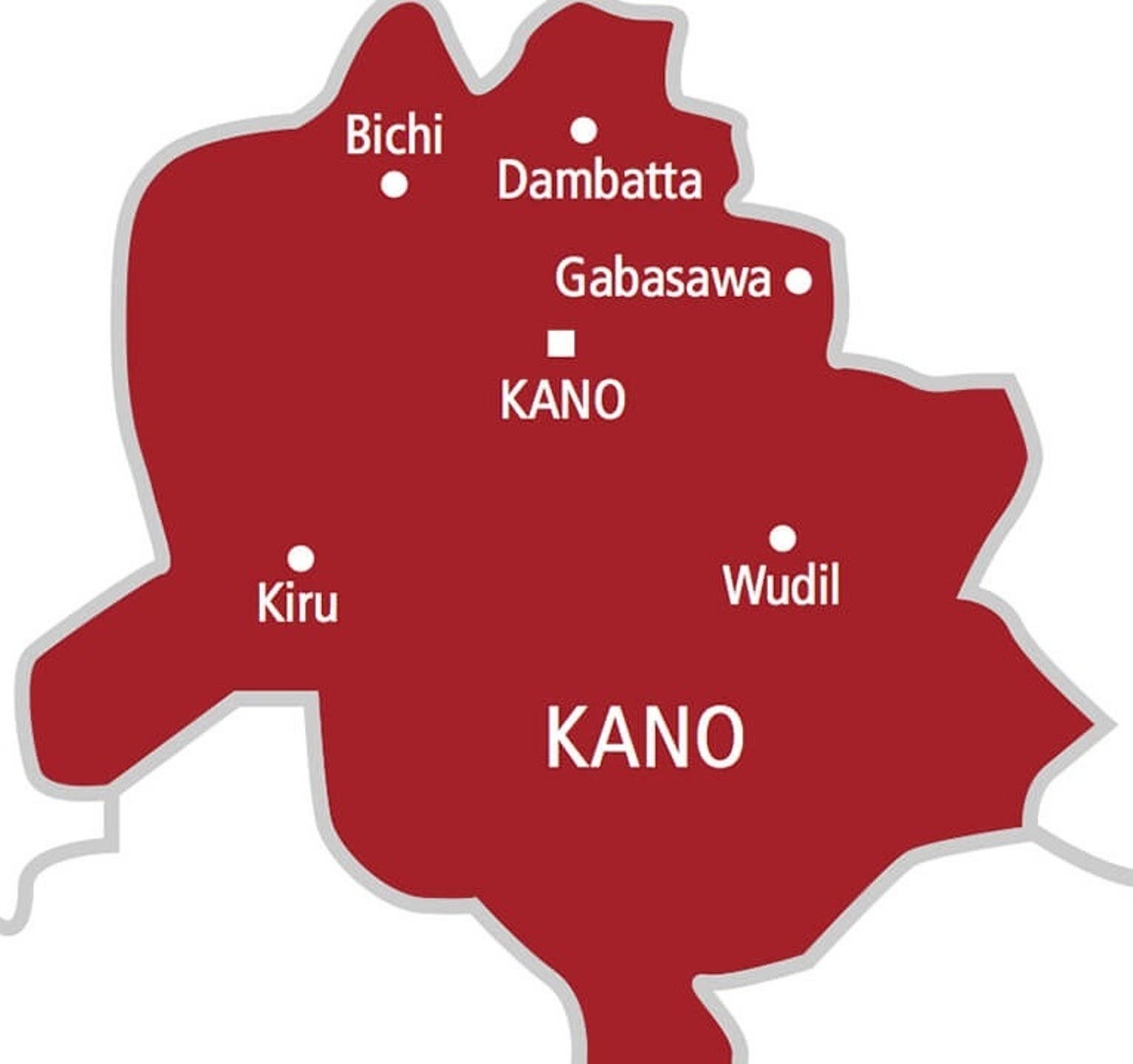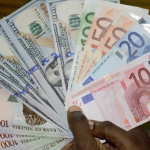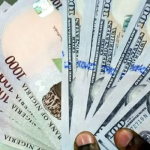CBN Dollar to naira today black market-
In this article, we are going to give you the current prices of the CBN dollars to Nigerian Naira currency.
Discuss about CBN dollar to naira today black market, CBN portal, and CBN exchange rate today. Do keep tuned to this website six9ja for more information.
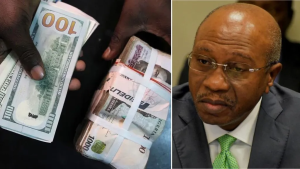
How much is dollar at CBN rate today?
| Currency | Sell / Buy Rate | Change |
|---|---|---|
| USD | ₦ 747.6 / 746.6 | -2.82% |
What is the CBN rate of Naira to Dollar?
| Date | Currency | Buying(NGN) |
|---|---|---|
| 9/28/2023 | US DOLLAR | 766.467 |
Cbn dollar to naira today black market
The CBN rate is actually cheaper than the black market rate. The CBN rate with its buying (NGN) at ₦761.543 is currently central (NGN) at ₦762.043 and currently selling (NGN) at ₦762.543.
100 CBN dollar to naira
200 CBN dollar to naira
151,491 Naira
500 CBN dollar to naira
378,727.5 Naira
1000 CBN dollar to naira
757,455 Naira
Dollar to naira today black market
On 03/10/2023, Dollar to Naira black market exchange rate today is between the price of ₦990 and ₦995 with an average of ₦991.67.
How much is $1 dollar in naira now?
CBN portal
The Central Bank of Nigeria is the central bank and apex monetary authority of Nigeria established by the CBN Act of 1958 and commenced operations on 1 July 1959.
The mandate of the Central Bank of Nigeria (CBN) is derived from the 1958 Act of Parliament, as amended in 1991, 1993,1997,1998,1999 and 2007.
The CBN Act of 2007 of the Federal Republic of Nigeria charges the Bank with the overall control and administration of the monetary and financial sector policies of the Federal Government.
The objects of the CBN are as follows:
- ensure monetary and price stability;
- issue legal tender currency in Nigeria;
- maintain external reserves to safeguard the international value of the legal tender currency;
- promote a sound financial system in Nigeria; and
- act as a Banker and provide economic and financial advice to the Federal Government.
Consequently, the Bank is responsible for administering the Banks and Other Financial Institutions Act (BOFIA), 2020, with the sole aim of ensuring high standards of banking practice and financial stability through its surveillance activities, as well as the promotion of an efficient payment system.
In addition to its core functions, CBN has performed some major developmental functions over the years, focussing on all the Nigerian economy’s key sectors (financial, agricultural, and industrial sectors). Overall, these mandates are carried out by the Bank through its various departments.
CBN exchange rate
| Date | Currency | Buying(NGN) | Central(NGN) | Selling(NGN) |
|---|---|---|---|---|
| 10/4/2023 | US DOLLAR | 761.543 | 762.043 | 762.543 |
| 10/4/2023 | POUNDS STERLING | 926.1886 | 926.7967 | 927.4048 |
| 10/4/2023 | EURO | 800.7625 | 801.2882 | 801.814 |
| 10/4/2023 | SWISS FRANC | 831.5604 | 832.1064 | 832.6523 |
| 10/4/2023 | YEN | 5.1141 | 5.1175 | 5.1208 |
| 10/4/2023 | CFA | 1.1724 | 1.1824 | 1.1924 |
| 10/4/2023 | WAUA | 975.2551 | 975.8954 | 976.5357 |
| 10/4/2023 | RIYAL | 203.0402 | 203.1735 | 203.3068 |
| 10/4/2023 | DANISH KRONA | 107.3291 | 107.3996 | 107.4701 |
| 10/4/2023 | SDR | 997.0882 | 997.7429 | 998.3975 |
Also, see: Australian dollars to Nigerian naira today
Dollar to naira yesterday
| 1 US Dollar to Nigerian Naira Exchange Rate | Updated: 05/10/2023 | |
| Date | US Dollar to Nigerian Naira | |
|---|---|---|
| Wednesday 4 October 2023 | 1 USD = 766.3 NGN | USD NGN rate for 04/10/2023 |
| Tuesday 3 October 2023 | 1 USD = 766.0 NGN | USD NGN rate for 03/10/2023 |
| Monday 2 October 2023 | 1 USD = 768.6 NGN | USD NGN rate for 02/10/2023 |
| Sunday 1 October 2023 | 1 USD = 775.3 NGN | USD NGN rate for 01/10/2023 |
| Saturday 30 September 2023 | 1 USD = 779.8 NGN | USD NGN rate for 30/09/2023 |
| Friday 29 September 2023 | 1 USD = 770.5 NGN | USD NGN rate for 29/09/2023 |
| Thursday 28 September 2023 | 1 USD = 778.5 NGN | USD NGN rate for 28/09/2023 |
| Wednesday 27 September 2023 | 1 USD = 781.5 NGN | USD NGN rate for 27/09/2023 |
| Tuesday 26 September 2023 | 1 USD = 779.6 NGN | USD NGN rate for 26/09/2023 |
| Monday 25 September 2023 | 1 USD = 780.3 NGN | USD NGN rate for 25/09/2023 |
| Sunday 24 September 2023 | 1 USD = 767.8 NGN | USD NGN rate for 24/09/2023 |
| Saturday 23 September 2023 | 1 USD = 765.2 NGN | USD NGN rate for 23/09/2023 |
| Friday 22 September 2023 | 1 USD = 770.5 NGN | USD NGN rate for 22/09/2023 |
| Thursday 21 September 2023 | 1 USD = 770.0 NGN | USD NGN rate for 21/09/2023 |
| Wednesday 20 September 2023 | 1 USD = 774.4 NGN | USD NGN rate for 20/09/2023 |
| Tuesday 19 September 2023 | 1 USD = 775.5 NGN | USD NGN rate for 19/09/2023 |
| Monday 18 September 2023 | 1 USD = 788.2 NGN | USD NGN rate for 18/09/2023 |
| Sunday 17 September 2023 | 1 USD = 784.0 NGN | USD NGN rate for 17/09/2023 |
| Saturday 16 September 2023 | 1 USD = 783.2 NGN | USD NGN rate for 16/09/2023 |
| Friday 15 September 2023 | 1 USD = 784.7 NGN | USD NGN rate for 15/09/2023 |
| Thursday 14 September 2023 | 1 USD = 777.7 NGN | USD NGN rate for 14/09/2023 |
| Wednesday 13 September 2023 | 1 USD = 746.7 NGN | USD NGN rate for 13/09/2023 |
| Tuesday 12 September 2023 | 1 USD = 744.9 NGN | USD NGN rate for 12/09/2023 |
| Monday 11 September 2023 | 1 USD = 752.8 NGN | USD NGN rate for 11/09/2023 |
| Sunday 10 September 2023 | 1 USD = 788.9 NGN | USD NGN rate for 10/09/2023 |
| Saturday 9 September 2023 | 1 USD = 785.5 NGN | USD NGN rate for 09/09/2023 |
| Friday 8 September 2023 | 1 USD = 785.5 NGN | USD NGN rate for 08/09/2023 |
| Thursday 7 September 2023 | 1 USD = 785.4 NGN | USD NGN rate for 07/09/2023 |
| Wednesday 6 September 2023 | 1 USD = 754.4 NGN | USD NGN rate for 06/09/2023 |
| Tuesday 5 September 2023 | 1 USD = 758.2 NGN | USD NGN rate for 05/09/2023 |
| Monday 4 September 2023 | 1 USD = 757.5 NGN | USD NGN rate for 04/09/2023 |
| Sunday 3 September 2023 | 1 USD = 757.1 NGN | USD NGN rate for 03/09/2023 |
| Saturday 2 September 2023 | 1 USD = 775.5 NGN | USD NGN rate for 02/09/2023 |
| Friday 1 September 2023 | 1 USD = 775.5 NGN | USD NGN rate for 01/09/2023 |
| Thursday 31 August 2023 | 1 USD = 774.1 NGN | USD NGN rate for 31/08/2023 |
| Wednesday 30 August 2023 | 1 USD = 773.2 NGN | USD NGN rate for 30/08/2023 |
| Tuesday 29 August 2023 | 1 USD = 772.5 NGN | USD NGN rate for 29/08/2023 |
| Monday 28 August 2023 | 1 USD = 772.6 NGN | USD NGN rate for 28/08/2023 |
| Sunday 27 August 2023 | 1 USD = 773.9 NGN | USD NGN rate for 27/08/2023 |
| Saturday 26 August 2023 | 1 USD = 775.0 NGN | USD NGN rate for 26/08/2023 |
| Friday 25 August 2023 | 1 USD = 772.2 NGN | USD NGN rate for 25/08/2023 |
| Thursday 24 August 2023 | 1 USD = 755.8 NGN | USD NGN rate for 24/08/2023 |
| Wednesday 23 August 2023 | 1 USD = 761.3 NGN | USD NGN rate for 23/08/2023 |
| Tuesday 22 August 2023 | 1 USD = 761.1 NGN | USD NGN rate for 22/08/2023 |
| Monday 21 August 2023 | 1 USD = 765.4 NGN | USD NGN rate for 21/08/2023 |
| Sunday 20 August 2023 | 1 USD = 767.8 NGN | USD NGN rate for 20/08/2023 |
| Saturday 19 August 2023 | 1 USD = 765.9 NGN | USD NGN rate for 19/08/2023 |
| Friday 18 August 2023 | 1 USD = 769.5 NGN | USD NGN rate for 18/08/2023 |
| Thursday 17 August 2023 | 1 USD = 768.5 NGN | USD NGN rate for 17/08/2023 |
| Wednesday 16 August 2023 | 1 USD = 760.6 NGN | USD NGN rate for 16/08/2023 |
| Tuesday 15 August 2023 | 1 USD = 761.5 NGN | USD NGN rate for 15/08/2023 |
| Monday 14 August 2023 | 1 USD = 766.9 NGN | USD NGN rate for 14/08/2023 |
| Sunday 13 August 2023 | 1 USD = 772.2 NGN | USD NGN rate for 13/08/2023 |
| Saturday 12 August 2023 | 1 USD = 771.3 NGN | USD NGN rate for 12/08/2023 |
| Friday 11 August 2023 | 1 USD = 769.2 NGN | USD NGN rate for 11/08/2023 |
| Thursday 10 August 2023 | 1 USD = 769.4 NGN | USD NGN rate for 10/08/2023 |
| Wednesday 9 August 2023 | 1 USD = 765.5 NGN | USD NGN rate for 09/08/2023 |
| Tuesday 8 August 2023 | 1 USD = 751.0 NGN | USD NGN rate for 08/08/2023 |
| Monday 7 August 2023 | 1 USD = 768.3 NGN | USD NGN rate for 07/08/2023 |
| Sunday 6 August 2023 | 1 USD = 765.6 NGN | USD NGN rate for 06/08/2023 |
| Saturday 5 August 2023 | 1 USD = 764.8 NGN | USD NGN rate for 05/08/2023 |
| Friday 4 August 2023 | 1 USD = 767.4 NGN | USD NGN rate for 04/08/2023 |
| Thursday 3 August 2023 | 1 USD = 778.0 NGN | USD NGN rate for 03/08/2023 |
| Wednesday 2 August 2023 | 1 USD = 776.4 NGN | USD NGN rate for 02/08/2023 |
| Tuesday 1 August 2023 | 1 USD = 758.5 NGN | USD NGN rate for 01/08/2023 |
| Monday 31 July 2023 | 1 USD = 760.4 NGN | USD NGN rate for 31/07/2023 |
| Sunday 30 July 2023 | 1 USD = 774.1 NGN | USD NGN rate for 30/07/2023 |
| Saturday 29 July 2023 | 1 USD = 775.7 NGN | USD NGN rate for 29/07/2023 |
| Friday 28 July 2023 | 1 USD = 775.8 NGN | USD NGN rate for 28/07/2023 |
| Thursday 27 July 2023 | 1 USD = 790.0 NGN | USD NGN rate for 27/07/2023 |
| Wednesday 26 July 2023 | 1 USD = 791.1 NGN | USD NGN rate for 26/07/2023 |
| Tuesday 25 July 2023 | 1 USD = 789.3 NGN | USD NGN rate for 25/07/2023 |
| Monday 24 July 2023 | 1 USD = 792.6 NGN | USD NGN rate for 24/07/2023 |
| Sunday 23 July 2023 | 1 USD = 792.0 NGN | USD NGN rate for 23/07/2023 |
| Saturday 22 July 2023 | 1 USD = 792.0 NGN | USD NGN rate for 22/07/2023 |
| Friday 21 July 2023 | 1 USD = 776.5 NGN | USD NGN rate for 21/07/2023 |
| Thursday 20 July 2023 | 1 USD = 781.8 NGN | USD NGN rate for 20/07/2023 |
| Wednesday 19 July 2023 | 1 USD = 791.5 NGN | USD NGN rate for 19/07/2023 |
| Tuesday 18 July 2023 | 1 USD = 778.6 NGN | USD NGN rate for 18/07/2023 |
| Monday 17 July 2023 | 1 USD = 777.5 NGN | USD NGN rate for 17/07/2023 |
| Sunday 16 July 2023 | 1 USD = 775.8 NGN | USD NGN rate for 16/07/2023 |
| Saturday 15 July 2023 | 1 USD = 775.6 NGN | USD NGN rate for 15/07/2023 |
| Friday 14 July 2023 | 1 USD = 777.0 NGN | USD NGN rate for 14/07/2023 |
| Thursday 13 July 2023 | 1 USD = 777.5 NGN | USD NGN rate for 13/07/2023 |
| Wednesday 12 July 2023 | 1 USD = 776.5 NGN | USD NGN rate for 12/07/2023 |
| Tuesday 11 July 2023 | 1 USD = 790.2 NGN | USD NGN rate for 11/07/2023 |
| Monday 10 July 2023 | 1 USD = 787.7 NGN | USD NGN rate for 10/07/2023 |
| Sunday 9 July 2023 | 1 USD = 766.1 NGN | USD NGN rate for 09/07/2023 |
| Saturday 8 July 2023 | 1 USD = 762.5 NGN | USD NGN rate for 08/07/2023 |
| Friday 7 July 2023 | 1 USD = 769.5 NGN | USD NGN rate for 07/07/2023 |
| Thursday 6 July 2023 | 1 USD = 774.1 NGN | USD NGN rate for 06/07/2023 |
| Wednesday 5 July 2023 | 1 USD = 774.5 NGN | USD NGN rate for 05/07/2023 |
Factors Influencing Foreign Exchange Rates
Foreign exchange rates play a crucial role in the global economy, impacting trade, investment, and international transactions. Understanding the factors that influence these exchange rates is essential for businesses, investors, and individuals involved in international finance. In this article, we will explore the key factors that drive foreign exchange rates and their implications.
Outline
- Introduction
- Supply and demand in the forex market
- Interest rates and monetary policy
- Inflation and purchasing power parity
- Economic indicators and market sentiment
- Political stability and geopolitical factors
- Current account and balance of payments
- Central bank interventions
- Capital flows and investor sentiment
- Market speculation and sentiment
- The interconnectedness of global markets
- Commodity prices and terms of trade
- Government policies and regulations
- Exchange rate regimes
- Impact on International Trade and Investment
- Conclusion
- FAQs
Factors Influencing Foreign Exchange Rates
1. Introduction
Foreign exchange rates refer to the relative value of one currency compared to another. These rates are determined by a complex interplay of various factors that shape the supply and demand dynamics in the foreign exchange market.
Understanding these factors is crucial for predicting and managing exchange rate fluctuations.
2. Supply and demand in the forex market
Foreign exchange rates are primarily influenced by the supply and demand dynamics in the forex market. When the demand for a currency exceeds its supply, its value appreciates, and vice versa.
Several factors contribute to the supply and demand of currencies, including economic conditions, interest rates, inflation, and investor sentiment.
3. Interest rates and monetary policy
Interest rates have a significant impact on exchange rates. Central banks use interest rates as a tool to control inflation and stabilize the economy.
Higher interest rates attract foreign investors, leading to increased demand for the currency and a stronger exchange rate. Conversely, lower interest rates can discourage foreign investment and weaken the currency.
4. Inflation and purchasing power parity
Inflation refers to the rate at which prices for goods and services rise over time. Countries with low inflation tend to have stronger currencies, as their purchasing power remains relatively stable.
The theory of purchasing power parity suggests that exchange rates should adjust to equalize the prices of identical goods in different countries.
5. Economic indicators and market sentiment
Economic indicators, such as GDP growth, employment data, and consumer confidence, provide insights into the overall health of an economy.
Positive economic indicators can boost investor confidence and attract foreign investment, leading to a stronger currency. Conversely, negative economic news can result in currency depreciation.
6. Political stability and geopolitical factors
Political stability and geopolitical developments significantly influence foreign exchange rates. Countries with stable governments and sound policies are more likely to attract foreign investment and have stronger currencies.
On the other hand, political uncertainty, conflicts, or geopolitical tensions can lead to currency volatility and depreciation.
7. Current account and balance of payments
The current account and balance of payments reflect a country’s trade and financial transactions with the rest of the world.
A current account surplus, indicating that a country exports more than it imports can strengthen its currency. Conversely, a current account deficit can weaken the currency.
8. Central bank interventions
Central banks sometimes intervene in the foreign exchange market to stabilize or influence their currency’s value. They may buy or sell currencies to increase or decrease their supply, thereby impacting the exchange rate.
Central bank interventions can be driven by various objectives, such as promoting exports, controlling inflation, or managing economic imbalances.
9. Capital flows and investor sentiment
Capital flows, including foreign direct investment, portfolio investment, and speculative capital, can have a significant impact on exchange rates.
When investors perceive a country as attractive for investment, they increase their demand for its currency, leading to appreciation. Conversely, capital outflows can weaken a currency.
10. Market speculation and sentiment
Market speculation and sentiment can drive short-term fluctuations in exchange rates. Traders and investors closely monitor market trends, news, and sentiment to make buy or sell decisions.
Positive market sentiment can strengthen a currency, while negative sentiment can lead to depreciation.
11. Interconnectedness of global markets
In today’s interconnected world, developments in one market can quickly impact others. Global financial markets are closely intertwined, and events in major economies can have ripple effects on exchange rates.
Factors such as interest rate changes, economic crises, or policy shifts in influential countries can affect currencies worldwide.
12. Commodity prices and terms of trade
Countries heavily reliant on commodity exports are vulnerable to fluctuations in commodity prices. Changes in commodity prices, such as oil, metals, or agricultural products, can impact a country’s terms of trade and its currency.
Higher commodity prices generally strengthen the currencies of commodity-exporting countries.
13. Government policies and regulations
Government policies and regulations, including trade policies, fiscal policies, and capital controls, can affect exchange rates.
For example, protectionist measures or tariffs can impact a country’s trade balance and currency value.
Likewise, changes in tax policies or government spending can influence investor sentiment and currency flows.
14. Exchange rate regimes
Different countries adopt various exchange rate regimes, such as fixed, floating, or managed exchange rates.
The chosen regime influences the flexibility of the exchange rate and the extent to which it can be influenced by market forces or government interventions.
15. Impact on international trade and investment
Foreign exchange rates have a direct impact on international trade and investment. A stronger domestic currency can make exports more expensive and imports cheaper, potentially affecting a country’s trade balance.
Exchange rate fluctuations also impact the profitability of foreign investments and the cost of servicing international debt.
Conclusion
Foreign exchange rates are influenced by a complex interplay of factors, including supply and demand dynamics, interest rates, inflation, economic indicators, political stability, and market sentiment. Understanding these factors is essential for businesses, investors, and individuals involved in international finance.
By staying informed and monitoring these influences, stakeholders can make informed decisions to manage exchange rate risks and seize opportunities in the global market.
FAQs
- Q: How often do foreign exchange rates change? A: Foreign exchange rates can change frequently, sometimes even multiple times within a single day. They are influenced by various factors and can be volatile.
- Q: Can governments manipulate exchange rates? A: Governments can intervene in the foreign exchange market to influence their currency’s value, but long-term sustainable changes are challenging to achieve.
- Q: How do exchange rates impact travel expenses? A: Exchange rates determine the cost of converting one currency into another, affecting travel expenses for individuals visiting other countries.
- Q: Are exchange rates the same for all currencies? A: Exchange rates vary for different currency pairs based on their relative value in the forex market. Each currency has its own exchange rate against others.
- Q: Do all countries have their own currency? A: No, some countries share a common currency, such as the Eurozone countries using the euro. Shared currencies eliminate exchange rate fluctuations within the group.
Do you find Six9ja useful? Click here to give us five stars rating!
